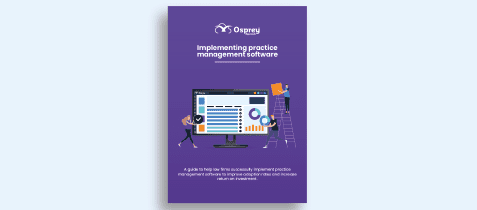Contents
A guide to investing in a future-proofed case management solution
The benefits of practice and case management software (PCMS) are widely known. Law firms have been steadily increasing their adoption of legal software over recent years but 2021 has highlighted new challenges that need addressing.

Without a choice, law firms have had to adapt to survive. Using the tools they have at hand, firms have had to adjust working practices to continue serving clients whilst in lockdown and working from home. This focused everyone’s attention back on to technology and how businesses can embrace it to make modern life easier to manage.
2020 taught us that it’s impossible to prepare for the unknown but it’s also showed us that those who are flexible and agile are prepared for change. Being prepared for change ultimately sets firms up for success. Whether your firm already has a PCMS in place or you’re in the market to implement a new one, it’s important to consider how effective the solution will be for your firm in the present, but also in the future.
Case management: an investment not a cost
Investing in legal software should be a considered process. Implementing a legal tech solution that isn’t effective for your firm can become a costly exercise. The pre-sale process, implementation, data migration and training require time that is scarce for lawyers in their day-to-day lives. We know the pressures lawyers face to maximise their billable time. That’s why choosing your next case management system is key for long-term success and team buy-in.
Carefully considered legal software projects save time, improve employee acceptance, makes change management easier and increases long-term success. With endless options in the market, knowing what product to choose or supplier to partner with is overwhelming. This is why you want to choose a solution that is long-term and future-proofed to fully reap the benefits and return on your investment.
There are plenty of quick, small and cheap software solutions out there that offer specific features and functionality like accounting, time recording or project management.
These types of software are often seen as a cost to the business, a tool to get a job done. For law firms looking to grow, scale and succeed they need an end-to-end solution that gives more.
A PCMS is an investment, not a cost. It returns financial benefits to a firm and drives the business and it’s employees to the next level. To maximise the return on your investment, it’s important to align your firms’ and your clients’ current and future goals with your software requirements. Planning for the future increases the longevity of your system.
What to consider in your search for the right PCMS
There are several considerations that affect the longevity of your software. We’ve outlined the key criteria you need to consider when making the right choice for your firm.
Bespoke or off-the-shelf CMS?
Traditionally there have been two methods of adopting and maintaining a CMS, and for many lawyers the debate remains open for the most successful strategy. The two side of the debate are: should firms use one of the available pre-defined products or collaborate with developers to design and maintain a bespoke system according to your own work processes? The debate ultimately narrows down to one key question: how much resource is your firm willing to assign to your PCMS for it to work successfully?
An off-the-shelf solution
A pre-defined CMS provides a set of standard tools and features that are aimed to cover either high-level functionality, suitable for all firms, or very specific functionality aimed at a particular area of law. This means you can be confident that the solution is tried and tested, used exhaustively, and is actively developed and updated. Typically, an off-the-shelf product could present some limitations in how the system works for your firm, but the biggest benefit is that the solution requires minimal implementation steps and training before it’s ready to use.
A bespoke solution
However, a bespoke CMS provides you with unlimited options for customisation but requires intensive resource from your firm to map out the features, functionality and processes you require. A bespoke CMS can be designed to meet your exact requirements, but it increases the spend and time needed to keep it up to date, and to amend in the future and add new features as time progresses.
The software you choose to invest in should provide you with the flexibility you need to effectively run your practice. The best CMS suppliers have helped to address the limitations of rigidly defined systems and resource-heavy bespoke solutions to provide software that is easy to configure, without the need to contact the supplier.
What to ask suppliers
Ask your suppliers how often the software is updated and whether you’ll have access to those releases as part of your agreement. It’s important to understand how the software would work with your processes and whether certain features and functionality can be configured by users, which will require development and cost and which areas can’t be changed.
Cloud vs on-premise
This decision isn’t as relevant today as it was a few years ago as many suppliers have moved to offering cloud-hosted solutions. The cloud offers firms flexibility, security, and business continuity. Many software providers have invested heavily in providing cloud solutions and many law firms have replaced their traditional systems with the latest tech advancements because it’s ultimately makes everyone’s life easier.
Using cloud software makes updates easier, security tighter, data centralised so simpler to manage, infrastructure costs reduced, hardware replacements redundant and scalability manageable. On-premise solutions can offer you 100% control of your data and means your infrastructure is completely owned by you, but consider if those benefits truly outweigh the negatives. Think of the future and consider your client’s need for digital solutions and employees needs for hybrid working and decide which is right for your strategy.
What to ask suppliers
It’s important to understand what additional infrastructure, if any, is need for the system to understand the full cost. Ask about cyber security, data back-ups and up-time. Cloud systems will be easier to update and easier to integrate with other software providers so consider what’s important for your firm.
Ongoing development and updates
For your firm to stay relevant and for your software to serve you for the long-term, ongoing development is crucial. If your system remains stagnant then so will your firm.
Changes in Government plans, compliance rules and the law will all have an effect on the way you work. Ensure your software can accommodate that. The frequency, cost and time involved in updating your software can heavily rely on the decisions you’ve made between cloud hosted or on-premise and off-the-shelf or bespoke.
This is why it’s important to know where you stand upfront. Typically, software providers include regular updates, bug fixes and new functionality as part of your agreement, but that’s not always the case. If you’re software isn’t on a subscription model, doesn’t have a support contract or is made bespoke for you, you might find you’re missing out on key updates or new features unless you may or request them.
What to ask suppliers
Be sure to ask how frequent new updates are released. Also ask how you’ll hear about them and if they include mandatory Government or compliance updates free of charge. Discuss if there are any additional fees involved in development and updates so you’ll be prepared should you need it.
Software partner support and guidance
Implementing a new PCMS or upgrading and switching to a new one isn’t always quick and easy. This is because practice management software involves all areas and all employees within your firm, so it’s important to minimize the disruption felt by everyone.
Implementing new software is only successful when everyone is on board. Prepare staff for change and dedicate time for training. Partnering with the right software supplier provides that comfort and confidence that you’ll be supported through the transition. This is why the support and training services are just as important to review as the product features and functionality.
Return on investment is only possible if the software users are fully trained and confident. Ensure support is easy to contact when things go wrong and ask if you’re assisted in fully optimizing your use of the system.
What to ask suppliers
Ask if there are additional upfront or ongoing costs associated with training, support, and implementation. Perhaps there are tiered options for the level of support you need, or flexible in-person and online help provided. Ask how much support will be given to you through go live and if that will change as you continue your partnership.
How your CMS should assist your firm
The minimum ask of a CMS has increased considerably and it simply isn’t enough to automate the production of documents. Firms now require smarter and more comprehensive solutions. The best CMS should enable firms to manage their entire practice from within one platform and automate repetitive processes to reduce admin-heavy workloads. Integrating with other specialised legal software solutions, such as e-signing documents, verification tools, sending email or SMS message, online client data collection also ensures your firm can continue to stay adaptable.
When choosing your CMS, think about your future goals. How will you manage your clients’ and refers’ increasing demand for online communications? Consider how your software will handle regulatory changes, data protection requirements and third-party integrations? Also think about how you and your clients will access the data held in your CMS; is the solution smartphone and tablet friendly or does it offer a portal for client access?
An effective CMS will enable your firm to be flexible and adaptable. Meeting future challenges is easier when your CMS is configurable to your needs. With a flexible CMS your can be confident you have the tools to run your firm from anywhere. Implement a CMS that will continue to provide ROI into the future and will allow you to stay compliant, effective and in control in a challenging environment.




